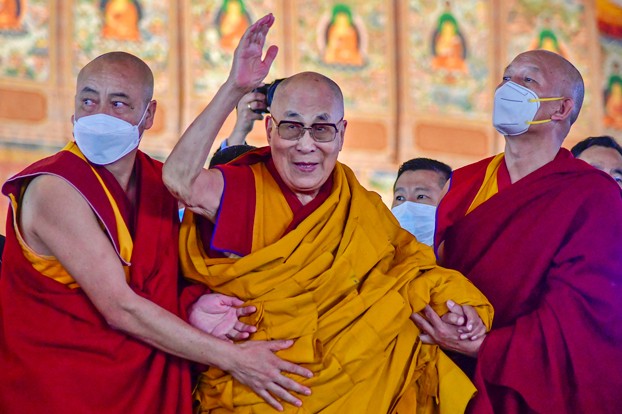US President Joe Biden would be willing to meet with the Dalai Lama in person, according to Tibetan exile leader Penpa Tsering, who met former House Speaker Nancy Pelosi last week as part of his second trip to the United States in as many years.
The White House did not respond to a request for comment from Radio Free Asia, but Tsering said Pelosi told him during a meeting at the Capitol on Wednesday, which also involved actor and Tibet supporter Richard Gere, that Biden would be open to meeting.
Tsering said the visit came after a similar meeting with House Foreign Affairs Committee Chairman Michael McCaul, and that he expected to soon meet with House Speaker Kevin McCarthy.
“We also had the honor of meeting with former Speaker Nancy Pelosi, who affirmed that President Biden would happily meet with the Dalai Lama. But whether that meeting will happen in person or not is something that we cannot confirm yet,” Tsering told RFA.
He stressed that no concrete plans existed.
“Tibetans in exile must remain cautious as the Chinese government can go to any lengths to create disharmony in our society by creating rumors,” the Tibetan leader explained. “Before sharing any information, we must verify it and measure its importance to see if it will do any good or harm to our community.”
The Dalai Lama fled to India during the failed 1959 Tibetan uprising against rule by China, which had invaded Tibet in 1950. Beijing has since promoted the “sinification” of the once independent country, which sits on a vast and strategically important plateau.
Tsering, meanwhile, has served as Sikyong, or head of Tibet’s India-based exile government, the Central Tibetan Administration, since April 2021, when he won a tight election. He arrived for his latest visit to the United States on Feb. 2 for what Tibetan leaders describe as an “official trip” to visit Tibetan communities in the United States and Canada. He is scheduled to depart on Feb. 17.
He last visited in April 2022, when he also met with McCaul, Pelosi and Gere, who is chairman of the International Campaign for Tibet and was for a time banned from the Oscars after his 1993 speech advocating for Tibetan independence during the award ceremony.
“We are trying to burst the myths or narratives that the Chinese government has been presenting for many decades about Tibet being a part of China, which is not true,” Gere told RFA during Tsering’s trip last year. “And we are trying to push for a genuine dialogue [between China] and His Holiness the Dalai Lama.”
Conflict with China ‘remains unresolved’
Tsering’s current trip comes as a bipartisan group of senators and representatives push for a bill that says Tibet was historically never part of China, and that “the conflict” between China and Tibet “remains unresolved.” It pushes for dialogue between the two parties to resolve the issue peacefully.
Beijing denies that Tibet was ever an independent country. Instead, it claims Tibet has been an integral part of China since the Mongol-led Yuan dynasty that ruled China nearly 800 years ago.
McCaul, the chairman of the House foreign affairs committee, said in a press release announcing the bill that it was important to recognize that China’s government “continues to oppress the Tibetan people.”
“Tibetans are subject to the CCP’s mass surveillance and censorship tactics and are arbitrarily killed or imprisoned for expressing their desire for freedom,” the Republican said, referring to the Chinese Communist Party. “I am proud to introduce this bipartisan bill to reject the CCP’s claims that their tyranny over Tibet is legitimate and will assert the Tibetan people have a say in their own future.”
The bill is co-sponsored by Rep. Jim McGovern, a Democrat from Massachusetts, and in the Senate by Todd Young, a Republican from Indiana, and Jeff Merkley, a Democrat from Oregon.
Rep. Chris Smith, a Republican from New Jersey, is also supporting the bill and met with Tsering this week in order to, he said, “reiterate and to begin planning a number of initiatives going forward.”
“Human rights are so important for the United States, and we call our European allies and others to join us,” Young told RFA on Wednesday. “We need to re-energize our efforts to help the people of Tibet and all others persecuted by the Chinese government.”
“We are very hopeful of the new Tibet-China legislation,” he added. “My message to people in Tibet is that we deeply care about Tibet.”
Copyright © 1998-2020, RFA. Used with the permission of Radio Free Asia, 2025 M St. NW, Suite 300, Washington DC 20036.







